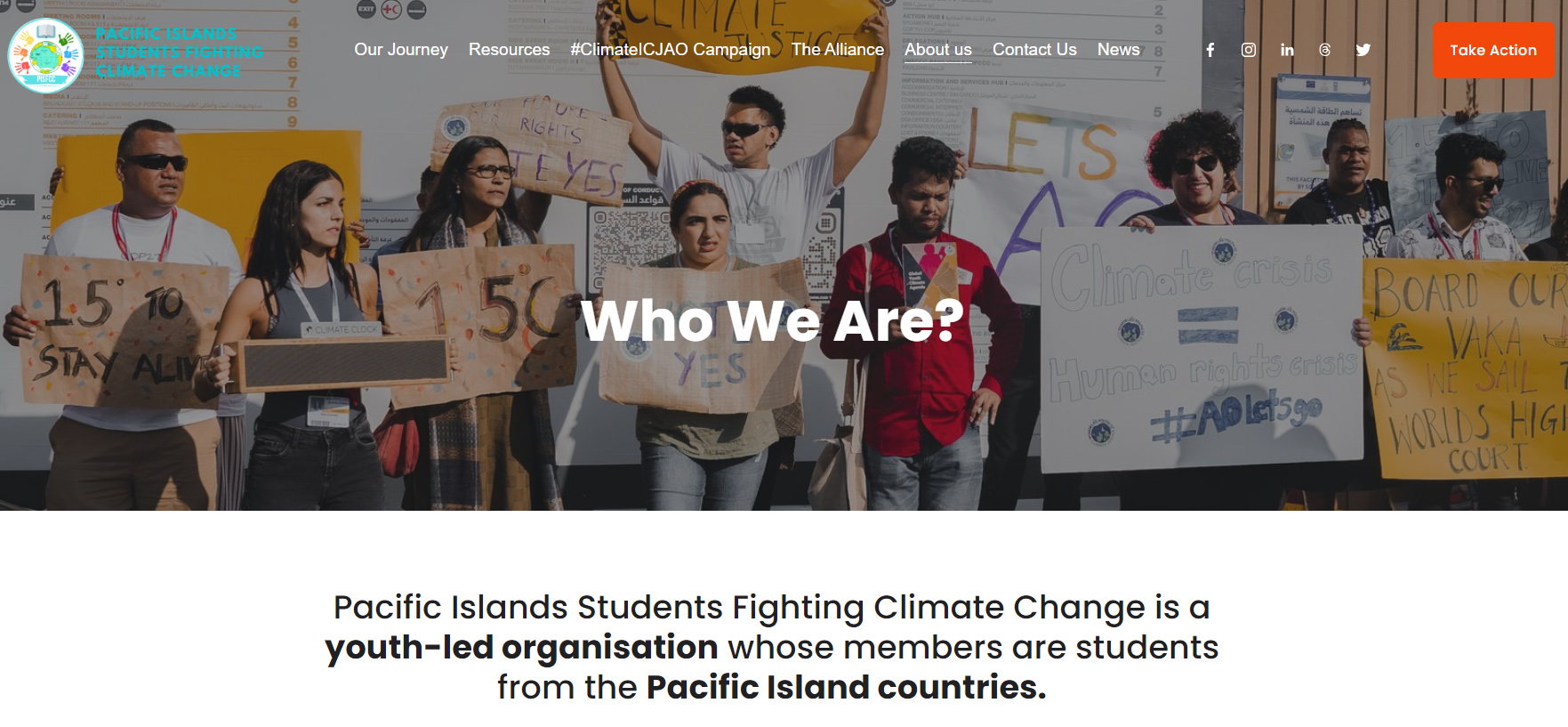 Website of the Pacific Islands Students Fighting Climate Change (PISFCC)
Website of the Pacific Islands Students Fighting Climate Change (PISFCC)
[This is an excerpt from an article in The Round Table: The Commonwealth Journal of International Affairs.]
Vanuatu’s advocacy on climate justice: a case study
Over recent years, we have seen that many vulnerable nations from SIDS in the Pacific region have called attention to the climate injustices they face. Political leaders, policymakers, civil society, and climate activists have increasingly advocated for ambitious climate action and for financial support to address the myriad cases of climate injustice people and communities have faced over the preceding decades. Indeed many young activists, including high school and university students, have led various rallies and demonstrations that have been a powerful driving force in bringing attention to issues of climate justice in Pacific island countries. However, the prevailing narrative that the Pacific island countries are ‘small and isolated … reinforces the idea that climate change impacts are primarily happening in places remote from wealthier nations’ (Morgan & Petrou, Citation2023).
In 2019, a group of 27 enthusiastic law students from the University of the South Pacific (USP) based on Emalus Campus, Vanuatu carried out research for a course on Environmental Law to find the most climate-ambitious tool that can push global negotiations for better outcomes. Citing frustrations caused by a world lack of adequate action on climate change and almost no delivery on climate justice, students were tasked with researching legal avenues available to push more accelerated action. Following their research, the students found that seeking an advisory opinion from the International Court of Justice (ICJ) – the world’s highest court – was the most ambitious avenue, and argued that a potential legal option could produce accelerated action for Climate Justice. Subsequently, in 2019, students from eight Pacific nations came together and launched an organisation within USP known as the Pacific Islands Students Fighting Climate Change (PISFCC). The objective was to persuade Pacific Island states to take the issue of climate change and human rights to the International Court of Justice.
This unique campaign has brought together grassroots initiatives and forged collaborative partnerships from all around the national, regional and international fronts to join their campaign. This started with the #EndorseTHEAO campaign, which brought together various university lecturers, academia, and policymakers from various Pacific Island states to support and endorse this campaign. The #EndorseTHEAO campaign was centred on themes of intergenerational equity and argued that future generations and their rights must be safeguarded and protected as it is they who will be facing the brunt of this climate crisis, so their rights must be protected as of now. The campaign also argued that whatever decisions on climate change are taken today will affect future generations of Pacific Islands residents and hence it is important that, in addressing climate change, intergenerational inequities must be highlighted by the region’s leaders and decision-makers.
Introduction to a special edition of the Round Table Journal – Climate justice and the Commonwealth: Justice or order?
Special edition of the Round Table Journal on climate justice and the Commonwealth
Australia prepares to welcome Tuvalu’s climate refugees
The PISFCC engaged and had various dialogues with the Vanuatu Government. Ralph Regenvanu, Vanuatu’s Foreign Affairs Minister at the time, was very open to hearing what the students had to bring to the discussions and this interaction started the campaign’s global journey to the United Nations. Two years later, in 2021, the Vanuatu Government announced that it had agreed to take up the PISFCC’s proposal to put forward an Advisory Opinion on climate change and human rights to the United Nations General Assembly (UNGA) in 2022. Thus, at UNGA 2022, Vanuatu officials lobbied other United Nations member states to join the core group and vote for the resolution once it is tabled at the UNGA.
On the 29 March 2023, the UNGA made history when it unanimously adopted Resolution 77/276 calling on the ICJ to issue an advisory opinion on the obligations of states relating to climate change and human rights. This resolution was led by the Vanuatu Government and co-sponsored by 132 countries, which included most ofthe Commonwealth Pacific Nations. This was a breakthrough and a landmark achievement for the Small Islands Developing States that have been impacted by the climate crisis, as it was adopted by consensus whereby no country opposed the vote on this advisory opinion. This advisory opinion is not legally binding, but it carries great moral and legal authority, and once it is issued by the International Court of Justice could give strong effect to the Paris Agreement, Law of the Sea (ITLOS), and other treaties relevant to climate change. Vanuatu believes that having the world’s highest court issue an advisory opinion on the matter of climate justice in Pacific Islands states could encourage these states and others to push for more ambitious action at COP and other climate negotiations, especially as it relates to the high-polluting countries paying for climate injustices, especially if they (the developed country and high emitters) fail to significantly reduce their carbon emissions in line with meeting the 1.5-degree Celsius objective.
Conclusion
Small Island Developing States in the Pacific, among Commonwealth member states most vulnerable to climate change, continue to face growing incidents linked to climate justice. This article has showed that advocacy and concerted action started by young people from the Pacific and later championed by the government of Vanuatu, including at the United Nations General Assembly, was successful in getting an advisory opinion on climate injustice and the Pacific adopted as a resolution.
Belyndar Maonia Rikimani is with the Ministry of Commerce, Industries, Labour & Immigration, Lawyer and Civil Servant, Honiara, Solomon Islands.



